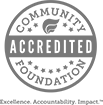Women Reach Potentials
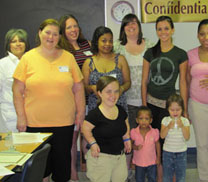
Research has shown that a woman with a college degree will earn 75 percent more than a woman possessing solely a high school diploma. But beyond this simple earnings statistic, the University of Toledo's Catherine S. Eberly Center for Women developed its program, Project Succeed, to help women in transition achieve economic self-sufficiency and personal development.
When the Center proposed a need to expand Project Succeed in 2009, the Foundation awarded a $43,702 grant allowing the Center to reach 150 more women.
According to the Center’s program manager, Angela Spoerl, different forms of Project Succeed have existed through the Center since 1983. This most recent incarnation of Project Succeed came about due to needs expressed by other community centers also dedicated to helping women in transition.
New Partners
Angela explains, "The YWCA Battered Women's Shelter, Ella P. Stewart Elementary School and Lucas County Metropolitan Housing Authority all expressed a need to partner with Project Succeed in order to bring our program to women they were helping. We developed modified versions of our 10-week Women's Success Series program, adapting our services to fit the needs of each of our new partners without duplicating services and worked with women on-site at the three locations."
Project Succeed's programming focused on personal, professional and educational development.
Angela notes, "We helped the women identify their goals and then counseled them on how to reach those goals. It was amazing to see the change take place: women who hadn't thought that higher education would be a possible path to take in their lives realized that it was attainable."
Foundation’s Help
The Foundation was able to support the entire Project Succeed expansion, including the program coordinator and the supplies and equipment necessary to conduct the program on-site at various locations. According to Angela, at the completion of the year-long program expansion, all three community partners were interested in continuing the program.
"The impact of the program was remarkable," she explains, "Sixty-five women attended cohort groups after their program participation was complete, 25 women decided to come to the Eberly Center for individual counseling appointments about pursuing college educations or finishing their GEDs, others continued to connect with us through advocacy work and our workshops for Jobs of the Future - healthcare and green economy positions."
Sharon’s Story
Sharon is just one of the women impacted by the outreach. She is a 50-year-old resident of Toledo who worked 26 years at GM, but retired early due to several health concerns. After retiring Sharon felt a sense of loss as to what was next for her, but she had an interest in designing clothes.
She heard about Project Succeed through a friend and attended the LMHA outreach program. Because of her age, Sharon had been worried she would be unable to find anyone to help her further her education and pursue her dreams, but through the program Sharon found exactly what she had been looking for.
Sharon said Project Succeed helped her find her own inner strength, and has shown her how to focus on her goals. After the outreach experience, she attended the Success Series at the Eberly Center. She has a new focus on personal health and fitness, the ability to use technology on her own, specifically to conduct online research for her new business, and the confidence she needed to begin college.
Fashion Business
Sharon will enroll at The University of Toledo to obtain a bachelor of arts in business management with a minor in visual arts, and continues to work hard to develop her clothing design business, "Rose of Sharon Fashions."
Angela notes that Sharon's story is not unusual for Project Succeed participants. The women the Center reaches out to include women dealing with job loss, domestic violence survivors, single mothers and women beginning new chapters in their lives.
"A lot of the women we help are going through some sort of crisis in their lives. People sometimes find it challenging to navigate through difficult situations, but the Eberly Center and Project Succeed help women see new opportunities and options,” she adds.
The Foundation proudly supports Eberly Center's Project Succeed and the success of today's women and generations of women yet to come.
Berlin Family Invests in Philanthropy
For Dave and Jean Ann Berlin of Hudson, Michigan, making their community a better place was a little more difficult than they imagined.
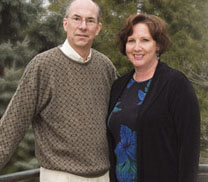
They wanted to help fund projects in their community and even quietly solicited for projects that might need some financial help. "But it was harder than we thought. This community pulls together and most of the projects we looked at were already completed. Others that we thought of were already financially taken care of," says Dave, president of Alumi-Span Inc. of Pittsfield, Michigan.
When Dave sold The Metalloy Corporation in 1989, the family decided some of the proceeds should be given to charity. "I soon realized I could not do this alone. I needed help."
That year the family established the Berlin Family Fund, a Donor Advised Fund, at the Toledo Community Foundation. The Fund's advisors include Dave and Jean Ann and their three children, Aaron, Amy and Chelsey.
"We had lots of offers for tax dodges after the sale but we wanted to invest in philanthropy. The Donor Advised Fund at the Foundation offers us the flexibility we were looking for with enough liberties to fund charities," says Dave.
The Berlins utilize the research services of the Foundation to make the most impact with their charitable giving. "It is not possible to know exactly what every charity needs. We trust the Foundation to help us with this," he adds.
Establish Your Fund
The Berlin Family ensured a permanent legacy of contribution to their community through a Donor Advised Fund at the Foundation. Learn more about the types of funds the Foundation offers for managing your philanthropic interests.
Types of FundsThe Foundation, based upon research conducted on nonprofit agencies, then makes suggestions for funding to the Berlins.
"Charities' needs change from year to year and we can't keep up with that. We trust and depend on the Foundation to do this for us. The staff prepares a list of charities that we might fund and then we talk about it and make our recommendations," he continues.
The Foundation also prepares reports on how the Berlin's funds have been used by charities. "This helps us to know that the gifts have been used to the best of our intentions.
"The investment performance of our fund has been pretty good. We've been able to maintain our initial investment and make a difference," he adds.
For Jean Ann, the reward has been being able to help people. The couple is not interested in having their name in lights for their efforts. "We can be anonymous in our giving because often we direct that the Foundation be listed as the donor," she says.
"Some people have big houses or big yachts. But how many of those things does anyone need? Those things are not important to us. Helping our community is," adds Jean Ann.
"For us the Foundation has done everything it said it would do. It has a sound reputation and we trust it. We couldn't be happier with what we have been able to do and hope to do for years to come," concludes Dave.
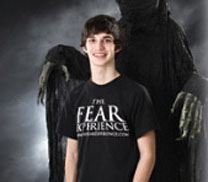
As a little kid Nick Francis, a 2010 Toledo Technology Academy graduate, had a special passion for Halloween. His decorations and parties were frightful.
Banking on an entrepreneurial hunch that others adore the spooky time of the year, Nick formed his own business, International Halloween Productions LLC, and created the most fearful commercial haunted house around.
The Ohio State University freshmen and recipient of three Foundation scholarships crafts new thrills and chills each summer for his 40 seasonal employees to scare the wits out of thousands of people each Halloween. But he wanted to give more than just screams to the community.
While in high school Nick participated in Youth Leadership Toledo and Youth in Philanthropy Encouraging Excellence, a program supported by the Toledo Community Foundation that teaches teens the importance of charitable giving.
The Eagle Scout applied his charitable knowledge to his haunted house venture, and so far the business has donated $11,000 to the Make-A-Wish Foundation.
Through his philanthropy, children get their special wishes, as Nick operates a spine-tingling venture.
A Legacy of Giving
More than 30 years ago, By West was asked to become a member of the first Distribution Committee of the Greater Toledo Community Foundation which was formed to manage and oversee funds to be granted to the community.
Those were rocky days. The Greater Toledo Community Foundation had just been re-established after many years of dormancy. "Because the real operation of the Foundation was so young we struggled, and I thought we would not survive, but eventually we got organized and were able to get underway," says By.
Establish Your Fund
The Greater Toledo Community Foundation will help you create your own legacy for the community like By and Laura West. Please contact Bridget Brell Holt, philanthropic services officer, at 419.241.5049 or [email protected].
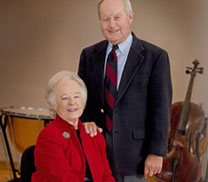
His years of serving as a volunteer with the Greater Toledo Community Foundation influenced him and his wife, Laura, to establish the Byron and Laura West Family Fund in 1999, a Legacy Society fund at the Foundation. In their wills, the Wests have made a commitment upon the death of the last surviving spouse to support various charities through the fund.
"We don't have the deepest pockets. But we have always been committed to the community's common good. The community has been very good to us," By notes.
He was born in Toledo, and Laura moved to the city at the age of five. However, it wasn't until they were students at the University of Michigan that they met.
"We reared our two children here and we were able to nurture our professional lives here. We have great friends in Toledo and are concerned about the community and its future," he adds.
"Providing for the future is one piece of retirement planning that needs to be in place. The Foundation is a source of comfort for us. It provides us with flexibility and helps us make good decisions," says Laura, a former clinical director of Harbor Behavioral Health Care, a mental health and United Way agency.
In addition to being members of the Legacy Society, the Wests established the West Donor Directed Fund to support the community through current gifts to various cultural, educational and environmental not for profit agencies.
They point out that the Foundation can guide them in making sound charitable gifts. "If we made specific early commitments to certain entities we might not be able to change our wishes if circumstances change. With the Foundation, which stays on top of institutions and their programs, we know good investments will be made," By adds.
By, who resigned as CEO of SSOE in 1989 and retired from West Carroll Architecture in 2002, recalls making appeals to his employees to support the United Way. "We had multiple cultures represented amongst our employees. Many had the perception that the government should take care of all the social needs. I would share with the employees that private agencies most often can do a better, more cost effective job helping people.
"I had a business associate from Hungary who was asked when he returned to his homeland what was one key difference between Americans and Hungarians. He said 'That's easy. Americans give away their money.' Most Americans do not understand how unusual this practice is," By adds.
Laura's parents were also very involved in the community. Her father was director of The Lucas County Family Court Center for almost 30 years and led the establishment of Linques, a community center for children. "My parents wanted to help make a difference and so do we. We're proud that our children feel the same way and support their interests with their own charitable gifts," she says.
Both By and Laura have served as volunteers and leaders of a number of not for profit organizations and through their activities have become aware of the community's needs.
As a trustee of the Toledo Orchestra Association Board (Toledo Symphony), By receives great enjoyment supporting his passion for music. "My mother was a concert pianist and I grew up with classical music. Perhaps the Symphony's biggest impact is that it functions as a brain gain for the community. I can almost guarantee that the IQs of those on stage are higher than most of us in the audience," he observes.
Although the Wests now live in Harbor Springs, Michigan, they frequently return to Toledo to enjoy the community that has helped transform their lives. "We care about the community. The Foundation has been blessed over the years with good leadership, so we know our legacy is in good hands," Laura concludes.
Many low- and moderate-income individuals and families in the community are eligible for various public benefits, but do not know what is available or how to apply.
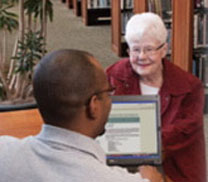
Often it takes several visits to multiple agencies to get the help they need. Many do not have the ability to get through all the details for such programs as food stamps, childcare or housing assistance, health insurance and veterans’ services.
With Lucas County’s poverty level greater than the state’s average, the majority of the residents who are eligible are not taking advantage of available cash assistance benefits.
Greater Toledo Community Foundation asked Advocates for Basic Legal Equality, Inc. (ABLE) to create a Mobile Benefit Bank staffed by AmeriCorps members who travel to churches, senior centers, food banks, festivals, housing shelters and other places where people congregate.
With more than $180,000 in grants from the Foundation, trained AmeriCorps members equipped with mobile computers, printers and telephones meet one-on-one with residents to determine what assistance is available and to provide free legal assessments.
This non-traditional approach has helped hundreds access almost $1 million in food assistance and $194,000 in tax refunds. With the success of the program and a grant from the Foundation, the Mobile Benefit Bank is expanding to Wood County and will help even more people live better.
Seeking a Grant
Visit www.toledocf.org for complete information about the Foundation’s grant making. For additional information, contact Senior Program Officer, Patrick Johnston, at Greater Toledo Community Foundation, 419.241.5049.
Call 419.241.5049Mud Hens Take Kids Out to the Ball Game
Going to the ball park to watch the Mud Hens take the field is only a dream for some kids.
These kids might not have the chance to catch pop up fly balls, giggle at the antics of Muddy and Muddonna or cheer with gusto for the hometown team because they can't buy a ticket.
To make sure that children who may not otherwise have the opportunity to experience the thrills at Fifth Third Field, the Toledo Mud Hens created the Helping Hens Fund through the Toledo Community Foundation's Center for Corporate & Business Philanthropy.
Establish Your Fund
The Mud Hens turned to the Foundation to provide administrative and financial services to their giving program. Learn more about the type of funds the Foundation offers corporations and businesses and how we can free up some of your valuable time.
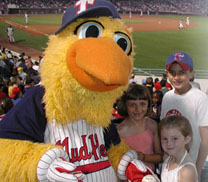
"We love kids at the park and we get numerous requests for tickets from children's organizations in northwest Ohio and southeast Michigan. The Helping Hens Fund allows us to give free tickets to deserving kids -- many whom have never been to the park before and who can't afford a ticket," explains Joe Napoli, Mud Hens Vice President and General Manager.
"We know the baseball and entertainment business but we certainly don't know the best way to manage a charitable fund. The Foundation is the expert in that field and it has helped us meet our giving intentions," he says.
Donations made to Muddy's Knot Hole Club by individuals or businesses are now part of the Fund. "In the past these donations were made directly to the Club.
"Now that donations to the Knot Hole Club go to the Helping Hens Fund, donors receive a tax advantage. It's a winning transaction for the donor, the Mud Hens and especially the kids who get to come to the park," says Joe.
Since the new stadium opened, requests for free tickets for children have increased dramatically. "To keep up with the demand it was taking more and more time. Now all of the administrative details from investing the funds, writing checks, and sending letters to deserving organizations is handled by the professionals at the Foundation.
"Whenever we have a question, the Foundation has an answer. It is an excellent organization and has a great reputation with a board of respected community leaders," he adds.
"The Foundation does all the work for us but we still make recommendations for our charitable donations. The letters we get back from the kids are amazing and make us appreciate the importance of youth to our community.
"Through our partnership with the Foundation, we can concentrate on baseball and the Foundation takes care of all of the details to get more kids to the park," concludes Joe.
Sight, the ability to see the world with which we interact on a daily basis, is a gift most of us take for granted.
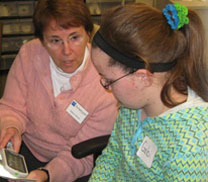
Being able to see the “on” switch for the coffee pot, noticing the obstacles in our way as we navigate steps, viewing our computer screens to conduct business – almost every task incorporates the need to see something. Even our language emphasizes the importance of seeing: we do not “hear,” “taste,” “smell,” or “feel” a new idea – we envision it.
Through discussions with the Sight Center of Northwest Ohio, the need to turn their visions into realities became clear to the Foundation. While the Center receives funding from sources such as Medicare and private insurance plans, Executive Director Dawn Christensen shares that most vision rehabilitation services and specialized adaptive equipment are not covered by insurance.
And the services the Sight Center provides to its clients are unique: rather than duplicating the services offered by primary eye care clinics, the Sight Center concentrates on the skills necessary to help people retain everyday independence. The Foundation has awarded grants totaling $120,000 in the last two years to fund programs to help just that.
From lessons in the daily living training center, such as how to prepare and cook food, to training with adaptive software programs aiding people with low to no vision to use computers, the Center offers specialized vision rehabilitation services so that people with low vision can make the best use of their remaining vision and people who are blind can continue to live independently.
The Sight Center aids all levels of vision loss, focusing on where there is a need to regain functionality and life skills, rather than drawing a line at certain visual acuity levels.
Making A Donation
To learn more about making a donation from your Foundation fund or establishing a fund to help support the Sight Center, please contact our Philanthropic Services Officer at 419.241.5049 or email Bridget Brell Holt at [email protected].
Call 419.241.5049The Center’s commitment to help people suffering from all levels of low vision means that the organization often has to find ways to financially support their diverse clientele, from very young children and their families to senior citizens.
“Through various Foundation grants, we have been able to provide our services to many individuals we would not have otherwise been able to reach, especially children and senior citizens. Our goal is to provide the skills and equipment to people suffering from vision loss in order to give them a level playing field in the world,” says Dawn.
The Foundation has aided the Sight Center in its role as a rehabilitation visionary as it continues to help those with vision loss – the young, the old, and the in-between – achieve independence in a world where we don’t necessarily need to see, in order to envision.
Sight Center Offers Stepping Stones
According to Dawn, the Center’s most impactful program has been Stepping Stones to Independence. Stepping Stones exceeded even her expectations. “We were given the opportunity to understand and know the needs of children experiencing vision loss and their families.
“It can be scary for the families of the individual, as well as the individual who experiences vision loss. Stepping Stones began as a program to teach children between the ages of 9 and 14 daily living skills to increase their confidence and to help them fulfill their potential.
“The program fulfilled its goals but also turned into a support group and a forum for the families going through the experience of raising a child with vision loss.
“Raising funds has always been one of the most difficult pieces of my job, but when I walked away from the meetings generated through Stepping Stones, I was truly moved. The parents and children participating in the program proved to me that we are here for a reason, we have a purpose,” she adds.
The services provided by the Sight Center allow people with vision loss to remain in their homes and to actively participate in their environments. As baby boomers age, the number of people who will experience vision loss will increase significantly.
As of this year, Dawn notes, “Sixty to 70 percent of the population we serve is currently 60 years of age or older and that population is growing. And the importance of vision to daily tasks and the ability to be independent makes the impact of increased numbers of individuals experiencing vision loss that much more critical.”
Remembering conversations around the dinner table with his grandfather and father about philanthropy, David K. Welles, Sr. says making financial donations to great causes is just second nature for him.
"It's always been a part of my life. But it's something that has to be taught," he adds with full agreement from Georgia, his wife.
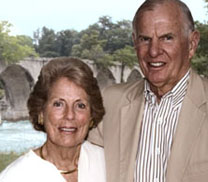
Realizing it's never too early to start, Georgia established the Granny Fund, a Donor Advised Fund, at the Toledo Community Foundation for their three grandchildren who call Perrysburg home. A Donor Advised Fund gives named advisors to the fund the opportunity to be active in making grants from the fund.
"I felt it was important for them to get started in giving at an early age and have the opportunity to make decisions. It is up to them to decide if they want to disburse interest from the Fund collectively or if each child wants to support individual interests," she explains.
Granny Fund
When the last grandchild reaches the age of 25, the Granny Fund dissolves and any remaining money will be distributed to the Foundation's Youth Philanthropy Fund, which supports programs to teach high school students about philanthropy.
The Granny Fund has given support to Assistance Dogs of America, Black Swamp Conservancy, and Cherry Street Mission, all of the Toledo area, and Magdalene House in Nashville, Tennessee.
"Our grandchildren are learning and are now involved in our family foundation that works throughout the country to prevent children from being at-risk. They are full participants in what we support and probably make more site visits to programs supporting children with disadvantaged backgrounds than we do," confesses Georgia.
Focus on Children
Their support of children is felt close to home with the Welles' Fund for Children & Youth at the Foundation. This Field of Interest Fund supports the educational and developmental needs of disadvantaged children in the greater Toledo area.
The Fund has enriched programs at Leadership Toledo, East Toledo Family Center, Connecting Point, Planned Parenthood of Northwest Ohio, YMCA of Greater Toledo and the Wood County Educational Service Center, just to name a few.
"Foundation staff work very hard to match our goals with the needs of the area. We are hopeful that our support helps children live better lives," says David.
The Welles are extremely proud of their five children who all are philanthropic in their own ways and with the family's foundation.
Establish Your Fund
The Welles Family found Donor Advised Funds at the Foundation to be the perfect way to continue their family’s long interest in local giving, while giving them the flexibility to focus on causes that match their varied and changing interests. Learn how to establish your own Donor Advised Fund.
Ways To Give"Our children give financial support and expertise to many worthwhile organizations. All have taken leadership roles at various educational institutions throughout the country," says David, recalling his wife's presidency on the Maumee Valley Country Day School Board of Trustees and as a Board member of the National Association of Independent Schools.
Thrill of Giving
Chicago area natives, the Welles moved to Toledo in 1955 for David's work with Owens Corning and their children were raised here. One of their recent donations to the community is the Georgia and David K. Welles Sculpture Garden at the Toledo Museum of Art.
"It's a continual joy to watch people explore the garden. Adults and children seem to love it and we love giving a gift that makes so many happy," says David, who served two terms as the Museum's chairman.
With the Cricket Fund, their third Fund at the Foundation, the couple makes donations to the Museum and other charitable organizations of their choice. This Donor Directed Pooled Fund is named for the Canadian island where they spend their summers.
After leaving Owens Corning in 1961, David started his own company, Therma-Tru the following year. Although the company has been sold, the Welles have not slowed down. One of Georgia's many projects is serving on the board of governors for The Nature Conservatory that works internationally to protect and preserve important natural lands and waters. One of David's new projects is Operation Hope that improves the lives of migrant families who pick citrus fruit in the Indian River region of Florida.
"We feel that we are leading by example for our family. We're so fortunate to have the Toledo Community Foundation. It makes it so easy to make investments, disburse funds and better the community. It's truly a community asset offering an excellent vehicle to support so many wonderful causes," concludes Georgia.
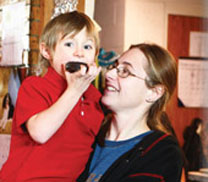
After serving free meals to neighbors of Jamie Farr Park in Toledo for nearly 20 years, volunteers were getting a little too old to round up the donations and cook the food.
They didn’t want to see the program end so they looked around the neighborhood and asked Friendly Center, a faith-based nonprofit agency less than a mile from the park, to help.
“Our vision statement says that no neighbor will go hungry, feel alienated, alone or powerless. Of course we said we would take over the hot meal program, and today we serve about 250 meals a month,” says Amelia Gibbon, Friendly Center executive director.
With a $28,875 grant from Toledo Community Foundation to transition operations of the program, neighbors are now getting nutritional hot meals three times a week, with a paid coordinator and volunteers earning a small stipend. “When kids are hungry they can’t learn; when moms are hungry they can’t be good mothers; and when men are hungry they don’t look their best to get work,” she adds.
“It is important that the people who come for the meals be treated with dignity and respect. We see a diversity of faces, and a hot meal impacts how they feel about themselves – it helps give them self esteem,” says Amelia.
“Food is the most basic human need, and our program not only feeds the stomach but the mind and soul too."
Amelia Gibbon, Friendly Center executive director
The Brad and Julie Rubini Family
After the sudden death of their 10-year-old daughter, Claire, in 2000, Brad and Julie Rubini wanted to honor their daughter and keep her alive by focusing on her love of books, storytelling and music.
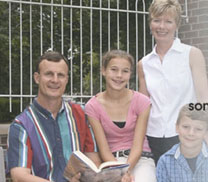
"We attended a support group for grieving parents. As I looked around the room and saw parents who were still in so much pain and darkness over their child's death after seven years or more, I decided I wanted to turn my energy into something positive for Claire," explains Julie.
Knowing they wanted to create a legacy for their daughter, they turned to acquaintances for help. "I asked a friend who does development about establishing a fund in Claire's name. She steered us to the Toledo Community Foundation saying it would be the best place to establish a perpetual fund," she continues.
"I'm not good with numbers and I didn't want to handle the fund. We felt the Foundation would be the easiest way to satisfy our needs," she says.
Tribute to Claire
In 2003, they established the Claire Lynsey Rubini Fund at the Toledo Community Foundation. In addition to their initial gift, another contribution has been given to grow the fund.
Establishing the Donor Advised Fund with the Foundation was "painless and all the details were so meticulously handled. We felt we could trust the people at the Foundation who cared enough to take care of our wishes," she adds.
Brad and Julie along with their children, Kyle and Ian, will make suggestions about grants from the Fund that encourage, promote and support reading and storytelling.
"Claire was an avid reader and loved storytelling. We were always in the Maumee library and I would take the children to story time. These were good times and we want to keep that spirit alive," says Julie.
"Our intent with the Fund is to excite children about reading by supporting classroom visits by children's book authors and illustrators," she continues.
Book Festival
The family knows first hand these visits have a definite impact. For the past three years, they, along with a group of dedicated volunteers, have presented Claire's (A Celebration of Life, Authors, Illustrators and Reading Excellence) Day at the Maumee Branch of the Toledo-Lucas County Public Library.
An average of 4,000 children and adults attend the free May book festival each year to the delight of the family.
Claire's Day features local and nationally known children's authors, illustrators, and storytellers holding workshops and demonstrations. The day includes children's activities and music. This year 10 authors made classroom visits to 10 schools.
Establish Your Fund
The Rubini Family created a legacy for their daughter Claire through a Donor Advised Fund at the Foundation. The fund celebrates Claire’s life and supports her passion for reading and storytelling. Learn how to establish your own Donor Advised Fund.
Ways to Give"You could just see the kids getting excited about reading and writing. The teachers were happy that the principles they teach were being reinforced by professionals who the kids admire," says Brad.
During the festival, C.A.R.E. Awards (Claire's Awards for Reading Excellence) are given to children pre-selected by their teachers and OhioReads volunteers to recognize reading achievements.
Celebration of Life
"It's truly a celebration of reading and Claire's life. I know she would be thrilled with the event. But I also know that Claire's Day may not last forever. When the time comes, if the community does not want to take over Claire's Day, any monies that may be remaining in the Claire's Day account will be placed in the Claire Lynsey Rubini Fund at the Foundation to continue to benefit the community," she says.
Julie admits that not a day goes by that she doesn't feel Claire's absence. "As a family, we lived well with Claire and we've decided that we will live well after she is gone. This is so important for Kyle and Ian."
"We never dreamed we would be in this position of doing something for the community. This life-altering event has allowed us to move forward for our family while bettering the community as a whole," says Brad.
"Philanthropy is so important and there is room for people of our age - the 35-50 year olds - to get involved. We've turned our tragic loss into something positive to honor Claire and keep her love for reading and life alive," he concludes.
